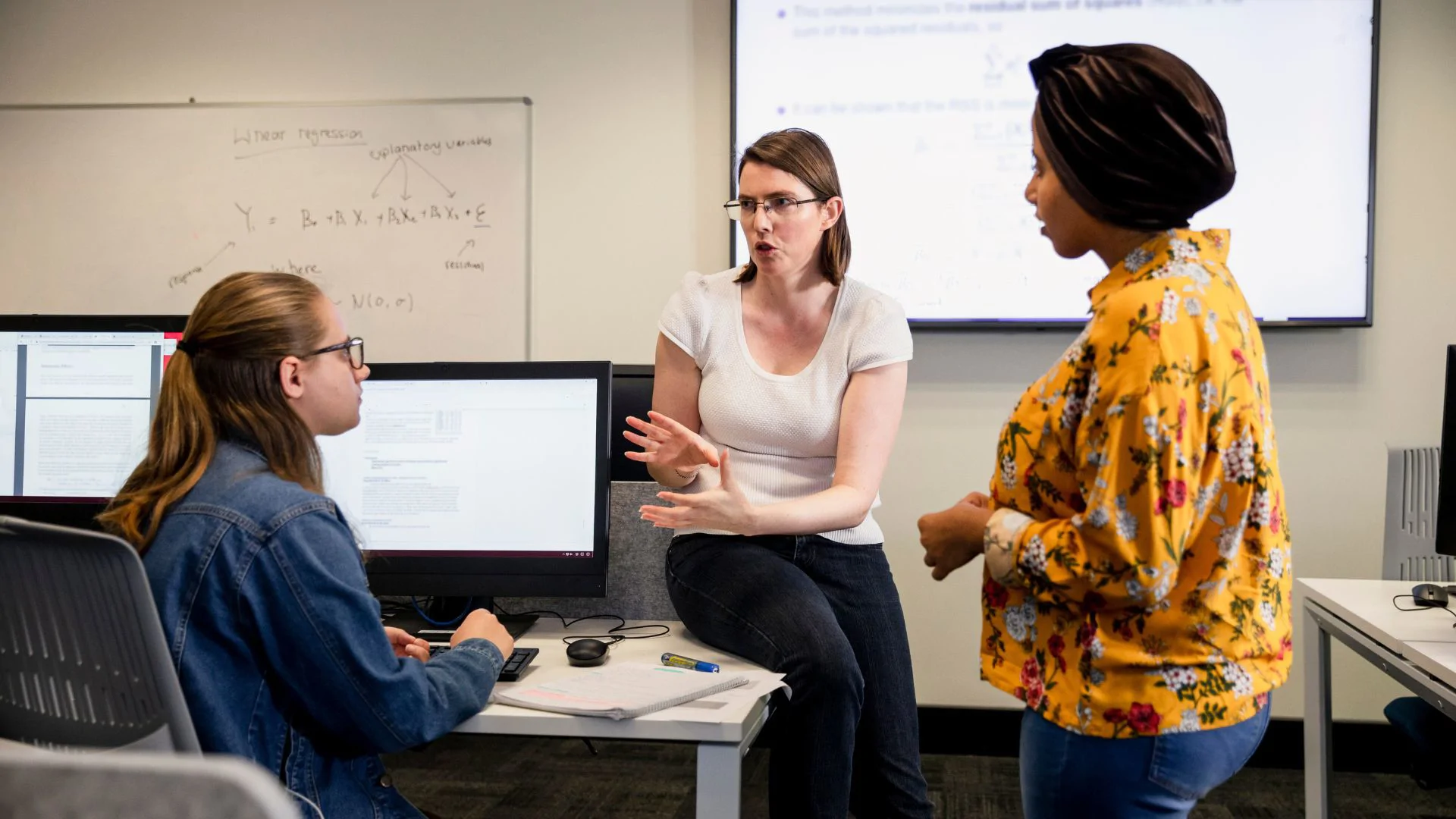Tips To Survive Your First Year as an Early Career Teacher
16 Apr, 20241-2 minutes
In this blog, you will learn:
- What an Early Career Teacher does in their first year.
- 7 top tips for your first year as an Early Career Teacher.
- Advice from an Early Career Teacher.
- How to find and apply for the best Early Career Teacher jobs.
Starting your first teaching job can be daunting, and your first year as an Early Career Teacher can be busy and demanding. You want to thrive as well as survive your first year as a Teacher, and look forward to a fulfilling career in the education sector.
The transition from the training process to a full Teacher workload isn’t an easy one. The first year can be one of the busiest periods of your career and you can sometimes feel like you’ve been thrown in at the deep end.
Knowing how to navigate your first year is crucial and you're probably in need of some advice on how best to embark on your teaching career.
Throughout this blog, we’ll uncover valuable tips and expertise on how to manage the workload, overcome obstacles and excel in your first year as an Early Career Teacher.
What does an Early Career Teacher do in their first year?
In the first 2 years of teaching, Teachers are known as Early Career Teachers (ECT) which has recently replaced Newly Qualified Teacher (NQT). The role is hands-on and the first year is meant to bridge the gap between initial teacher training and full-fledged teaching.
Despite being newly qualified, Early Career Teachers have the same responsibilities in the classroom as a fully qualified and experienced Teacher. The first 2 years as a Teacher gives you the chance to apply what you’ve learned in your teacher training and put that into motion in a real classroom.
As an Early Career Teacher, you are responsible for the progress of a group, or group of pupils over an academic year and will be required to apply all the skills and the teacher standards in order to offer the best education.
From planning and delivering lessons, to marking books and assessments, Early Career Teachers are expected to work as a fully-fledged staff member. Early Career Teachers undergo an induction period and after two years they become a fully qualified Teacher.
Tips for your first year as an Early Career Teacher?
The first year as an Early Career Teacher is very much a hands-on learning opportunity. Here are 7 top tips to sail you through your first year as an Early Career Teacher:
- Believe in yourself.
- Build relationships.
- Use your time wisely.
- Prioritise your work.
- Get to know your students.
- Celebrate the small stuff.
- Ask for help.
Believe in yourself
It’s easy in a new job to feel inadequate and in your first year as an Early Career Teacher, you will experience challenges and setbacks. Feeling like an imposter or underqualified is common, but you have worked hard to get to where you are.
Take your uncertainty and self-doubt as an opportunity for growth and exploration in your teaching career. Consider how your skills, passion and accomplishments have helped you so far in the teacher training part of your career and redirect your energy towards positivity.
Early Career Teachers are equipped to do their job successfully, and must have faith in themselves as mentors and educators.
Trust your training and your instincts as it can give you the confidence to navigate the classroom and take action. If you don’t believe in yourself and your capabilities, how can you expect your pupils to believe in themselves?
Build relationships
In every work environment it’s important to forge relationships and trust your colleagues.
In your first year as an Early Career Teacher, spend time getting to know your coworkers, especially your support staff so that you will have an incredible network of advice and expertise to draw on.
An Early Career Teacher offered her top tip, citing “my advice would be to make sure that you are fully supported in all aspects of education. Staff relationships are so important so make sure you are surrounded by a team of people that you can rely on and that can rely on you.”
Every member of staff you interact with when working in a school can make your life easier and help you even in difficult situations. Mentors can help accelerate your learning and have a positive impact on your progress.
Use your time wisely
Every Teacher is entitled to Planning, Preparation and Assessment (PPA) time to allocate time for planning, preparation and assessment. In addition to this, Early Career Teachers receive an extra 10% timetable reduction in their first year for extra non-contact time away from the classroom to focus on their learning and development.
For a Teacher, time is crucial and in your first year you might find yourself saying yes to everything in a bid to prove your enthusiasm and suitability for the role. However, Teachers need to possess excellent time management skills and be able to prioritise and break down tasks into manageable steps.
It is important to use your time wisely, especially your PPA allowance and your ECT’s 10% timetable reduction, in order to mark and plan, but also focus on your learning and development whether that be by attending school meetings, reflecting or being mentored.
Prioritise your work
As a Teacher, it can be difficult to juggle the many responsibilities and tasks required to successfully do your job in the classroom. A lot is expected of Teachers, and it is important to understand that not everything on your to-do list is created equally.
Identify your goals, try to prioritise tasks and rank your list to get the most important or high impact ones done first.
Gain a sense of your priorities and how you would like to plan or schedule your responsibilities and review your workload. Being organised and able to delegate responsibilities where appropriate you can create realistic deadlines and follow a structured workload.
Get to know your students
An important tip for your first year as an Early Career Teacher and the rest of your career, would be to get to know your students. An Early Career Teacher explained that it is important to “research the needs of the children and get to know them and their families as much as possible.”
Every Teacher wants their pupils to like them and to have a positive and meaningful impact on their lives and their future. Knowing that you are putting in the effort to connect with your students can greatly improve your wellbeing and impact your teaching strategies.
Children learn better in environments with positive relationships and if you, as an Early Career Teacher, show that you value a pupil's knowledge and input, this can greatly improve the relationship and the pupils mental health. Ask questions and start conversations with students to show your genuine interest in them.
Not only can a close relationship with students positively impact parents, but it can also give you the confidence to better understand your students' needs and your efforts will pay off.
Celebrate the small stuff
In your life and career, things will go wrong and not go according to plan. That doesn’t mean you should feel disheartened or that you are a failure. An Early Career Teacher advised, “Celebrate all the small wins, and don’t blame yourself or your abilities if things aren’t working out.”
In your first year in education, it’s important to recognise your progress and acknowledge the small wins along the way. Reflect but don’t dwell on any mistakes or errors, and reflect on what went well and any success you have.
Set achievable goals and celebrate your achievements, big and small. This can be a great motivator as an Early Career Teacher and can set you up for even bigger goals in the future.
Ask for help
The first year in any new job will have its challenges, and if you find yourself struggling as an Early Career Teacher, or needing help, speak to your mentor! There’s no shame in asking questions, or sharing when things get tough or uncertain.
As a Teacher, you are always learning, and there is plenty to be learnt on the job. No one expects Early Career Teachers to be perfect, in fact, in the first year of your career in education, questions and mistakes are to be expected.
Mistakes help you learn, but it’s important that you feel confident and sure of what you are doing. Asking for help can often be the quickest and most efficient way of checking that you are doing what needs to be done and that you feel supported in the classroom.
Unlike experienced Teachers, Early Career Teachers receive structured support and training from staff and their mentors. Schools can be hugely supportive environments, so if you need support or have concerns, speak to a member of the Senior Leadership Team (SLT).
ECT Teacher jobs
If you’re searching for an ECT Teacher job, why not take a look at the latest ECT Teacher vacancies, or simply upload your CV to be notified when a relevant position becomes available.
If you found this interview useful, check out our other interviews?
- Interview with an Early Career Teacher
- What It's Really Like To Be A Newly Qualified Teaching Assistant
- Instincts and Advice From a Teaching Assistant
Recruiting Early Career Teachers?
As experts in mainstream and SEND school recruitment, we support schools with their temporary, permanent and temp-perm staffing needs.
We currently work with hundreds of schools and have exclusive access to some of the best Teachers, Teaching Assistants and Early Career Teachers in the North West.
If you’re struggling to fill an Early Career Teacher vacancy, why not get in touch with one of our team to see how we can help?
- Primary schools - Jimmy Callagher
- Secondary schools - Liam Jones
- SEND schools - Jamie Heath
Who is Spencer Clarke Group?
Established in 2017, we’re a vibrant and progressive recruitment agency based in the heart of the North West.
We continually reimagine the recruitment process to challenge convention and defy expectations; from creating a better recruitment experience to remodelling employee engagement, we thrive off doing things differently and turning heads along the way.
We operate in two sectors:
In eleven specialisms:
Healthcare, Social Care & Nursing
Corporate Functions & Business Support




